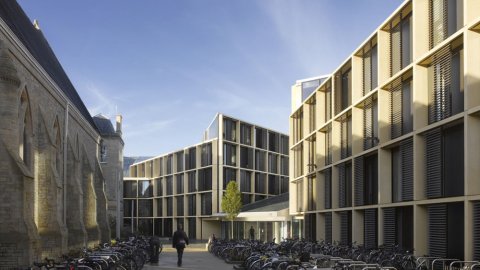From today, the College Store which sells our swag (and that of many colleges and departments) will launch its Green Friday campaign.
This offers a 15% discount on all items. Additionally, for every order placed using the discount code GREEN15, they will plant two trees instead of the one they usually plant on most purchases.
Francis Brown is among four Oxford University academics who are co-leading new research projects backed by European Research Council (ERC) Synergy Grants which foster interdisciplinary and international collaboration between outstanding researchers.
16:00
Division rings in the service of group theory
Abstract
Embedding the group algebra into a division ring has proven to be a powerful tool for detecting structural properties of the group, especially in relation to its homology. In this talk, we will show how division rings can be used to identify residual properties of groups, one-ended groups, and coherent groups. We will place special emphasis on the class of free-by-cyclic groups to provide a clear, explicit exposition.
Deep Learning for Inverse Problems: Theoretical Perspectives, Algorithms, and Applications
Abstract
Recent years have witnessed a surge of interest in deep learning methods to tackle inverse problems arising in various domains such as medical imaging, remote sensing, and the arts and humanities. This talk offers an overview of recent advances in the foundations and applications of deep learning for inverse problems, with a focus on model-based deep learning methods. Concretely, this talk will overview our work relating to theoretical advances in the area of mode-based learning, including learning guarantees; algorithmic advances in model-based learning; and, finally it will showcase a portfolio of emerging signal & image processing challenges that benefit from model based learning, including image separation / deconvolution challenges arising in the arts and humanities.
Bio:
Miguel Rodrigues is a Professor of Information Theory and Processing at University College London; he leads the Information, Inference and Machine Learning Lab at UCL, and he has also been the founder and director of the master programme in Integrated Machine Learning Systems at UCL. He has also been the UCL Turing University Lead and a Turing Fellow with the Alan Turing Institute — the UK National Institute of Data Science and Artificial Intelligence.
He held various appointments with various institutions worldwide including Cambridge University, Princeton University, Duke University, and the University of Porto, Portugal. He obtained the undergraduate degree in Electrical and Computer Engineering from the Faculty of Engineering of the University of Porto, Portugal and the PhD degree in Electronic and Electrical Engineering from University College London.
Dr. Rodrigues's research lies in the general areas of information theory, information processing, and machine learning. His most relevant contributions have ranged from the information-theoretic analysis and design of communications systems, information-theoretic security, information-theoretic analysis and design of sensing systems, and the information-theoretic foundations of machine learning.
He serves or has served as Editor of IEEE BITS, Editor of the IEEE Transactions on Information Theory, and Lead Guest Editor of various Special Issues of the IEEE Journal on Selected Topics in Signal Processing, Information and Inference, and Foundations and Trends in Signal Processing.
Dr. Rodrigues has been the recipient of various prizes and awards including the Prize for Merit from the University of Porto, the Prize Engenheiro Cristian Spratley, the Prize Engenheiro Antonio de Almeida, fellowships from the Portuguese Foundation for Science and Technology, and fellowships from the Foundation Calouste Gulbenkian. Dr. Rodrigues research on information-theoretic security has also attracted the IEEE Communications and Information Theory Societies Joint Paper Award 2011.
He has also been elevated to Fellow of the Institute of Electronics and Electrical Engineers (IEEE) for his contributions to the ‘multi-modal data processing and reliable and secure communications.’


